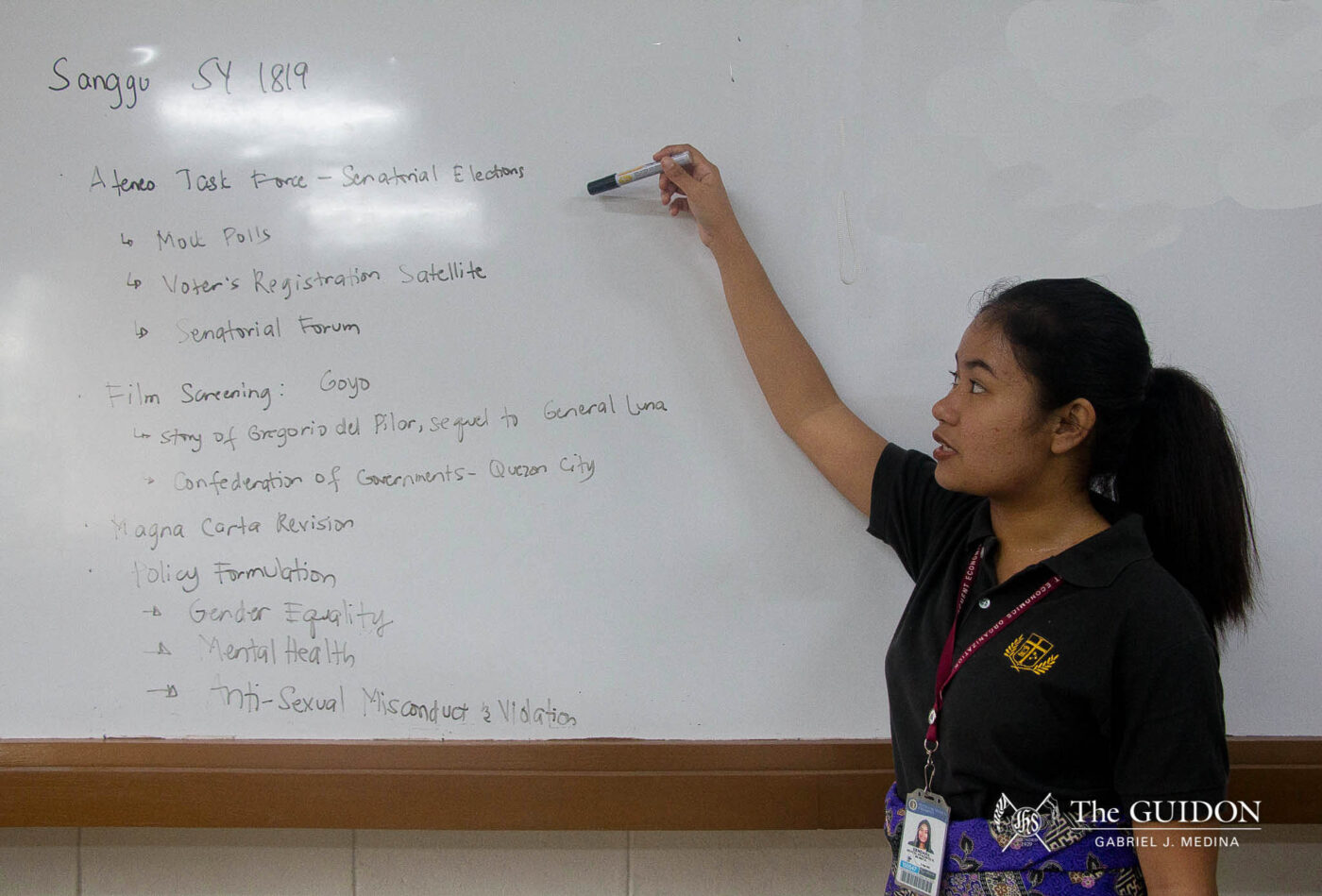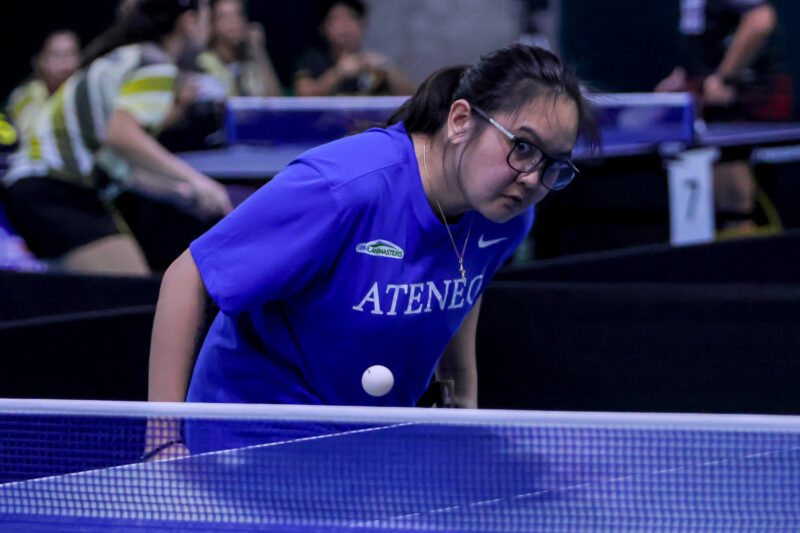Another school year is upon us, and with it comes a new set of faces behind the ranks of the Sanggunian. The past performance of the student government has dashed the expectations of some students with temperance and reservation, but as always, a sliver of hope remains for this administration. The fresh ideas and perspectives that they bring to the table may just be what the Sanggunian needs to restore its relevance, bolster its efficacy, and solidify its respect within the Ateneo.
Engagement
This year, Sanggunian President Reycel Hyacenth “Hya” Bendaña has promised increased communication with the Loyola Schools community. Besides email communication, Bendaña mentions that the Sanggunian will actively seek the concerns of the student body through social media.
This newfound shift in focus was spurned by her observation that “viral posts or issues [where] Ateneans [feel] the strongest sentiment require urgent engagement.” A recent example includes partnering with Ateneo GABAY, the Office of Admission and Aid, and parents from Ateneo High School Batch 2017 to fund management sophomore Xyver Supnet’s tuition and provide him with allowance. Supnet’s difficulty to make ends meet led to his friend creating a GoFundMe page which attracted some online attention, which led to the Sanggunian stepping in.
While this methodology of using social media has already met some level of success by way of engagement, such as in the case of Supnet, the sustainability of sifting through social media for issues remains a concern. For some students in the Ateneo, it may not be viable to address certain issues in the public sphere of social media. In deeply personal cases such as sexual harassment and mental health, victims may not want to share such intimate details of themselves without the shroud of anonymity.
Nevertheless, the Sanggunian is still committed to communicating with the student body through the traditional “#UsapTayoLS” hashtag, formal petitions, and other such means. These platforms have helped pave the way towards waiving miscellaneous fees for practicum courses and acquiring the 50% discount on library fees during the Intersession period this school year.
To add to Bendaña’s plans, individual Sanggunian branches also have their own specific courses of action to engage their constituents.
For instance, School of Science and Engineering (SOSE) Representative Bea Gruta aims to reinforce the plurality of voices within the SOSE Sanggunian. Since courses such as BS Health Sciences do not have any recognized home organizations, the course is unable to have an official elected representative within the Sanggunian. To counteract this, Gruta and other officers have decided to assign two permanent representatives to the course.
To date, this policy has already started to pay off, as she has recently successfully engaged with the administration, assigned representatives, and amended the situation of students being charged with Intersession laboratory fees despite not using the laboratories for their theses. Having more collaborations with the administration to fix other academic issues, such as printing and funding of theses, is also on the horizon.
Transparency
Bendaña stresses that regular reports will be published, starting with the months of May to July 2018. These will contain the Sanggunian’s directory, events, initiatives, and policies for the designated time period.
Notably, previous administrations also promised a similar concept. The 13th resolution of the 2016-2017 Sanggunian in particular sought to “pursue an open, transparent, and accountable Sanggunian” by way of an official website. Furthermore, this website was to be “open to the public” and “contain all relevant documents, announcements, and information related to the Sanggunian.
Another case involves Executive Order 1 under former Sanggunian President Carmela Vinzon, which states that the Sanggunian has to “prepare data related to systems and management. This shall include organization charts, action plans, strategic analyses, transcripts of planning seminars and sessions, memoranda, and other public issuances.”
Upon further inspection, the plans to create an official website did not come to fruition, but a detailed Excel file was created and made accessible for the student body to track the credit and debit used by the Sanggunian for school year 2016-2017.
While this has set an ample precedent for financial transparency, it also showcases the past administrations’ struggles to streamline the disclosure of its policies and agenda. This year’s Sanggunian is looking to have another go at this with the creation of the aforementioned reports, but whether they will be able to properly and consistently deliver the desired transparency still remains to be seen.
Projects
The Sanggunian has a plethora of projects in store for the year. Three new commissions have recently been created, namely the Commission on Gender Equality, the Commission on Anti-Sexual Misconduct and Violence, and the Commission on Mental Health, each dedicated to Gender Equality, Anti-Sexual Misconduct and Violence, and Mental Health respectively.
The commissions are expected to “draft advocacy-based policies, lobby to [the administration,] and launch three campaigns: #LoveAlwaysWins, #HelpIsHere, and #NoMeansNo,” according to Bendaña. Also included in their efforts are “(1) conducting trainings to [human resources] of organizations to capacitate them to handle cases for mental health and gender-based violence and discrimination, (2) active participation in the revision of Magna Carta, (3) crafting advocacy-based policies, and (4) coordinating with admin on university protocols,” she adds.
Moreover, this Sanggunian is also having another go at tackling sectoral representation. Perhaps the most ambitious attempt at such was the second resolution of the 2016-2017 resolutions, which mandated the creation of a technical working group in charge of creating procedures and policies for the planned Sectoral Representation Act, as well as the different deputies and officers of the group.
Unfortunately, despite a strong start headlined by a public hearing on February 6, 2017 attended by Muslims, scholars, and women, the program struggled after the launch, with multiple sectors on the sign-up sheet remaining blank. The program itself never received official updates after the initial call for representatives, indicating the level of difficulty surrounding the push for sectoral representation within the student government.
Similarly, this year’s Sanggunian is also dedicated to continuing the fight against sexual harassment. The longstanding issue’s first major appearance was in January 2017, when the Sanggunian officially released a memo in response to sexual harassment cases in other universities. This led to the creation of Ateneo Avow, or the Ateneo Women’s Desk. The desk allowed students to report cases of Sexual Harassment or Sexual Misconduct to the Sanggunian within the testing period of March 27 to March 31, 2017. However, the initiative failed to progress past the initial testing stage.
Following this, the Sanggunian released a tentative sexual misconduct policy in January 2018. It was made available to the public, so students were encouraged to comment on the document, ask questions regarding the different sections, and suggest changes to the policy as they saw fit. Currently, the Sanggunian plans to send this proposed sexual misconduct policy to the Vice President of the Loyola Schools (VPLS) Maria Luz C. Vilches.
In conjunction with this, the Commission on Anti-Sexual Misconduct and Violence (CASMV) has also been brought together. This is aimed at being the successor to Ateneo Avow, as that platform was effectively able to set the groundwork for the new commission by “[voicing] out a lot of concerns on how the admin previously dealt with peer-to-peer sexual assault cases,” Bendaña says.
The CASMV allows for easier communication with the VPLS, the Office for Student Services, and the like. Unlike its predecessor, it is designated to refer victims for Post-Traumatic Stress Disorder therapy to partner psychologists in either the Loyola Schools Office of Guidance and Counseling or the Ateneo Bulatao Center for psychological services. Avow, on the other hand, only allowed students to report their cases to the Sanggunian. In cases of rape and assault, victims will be directed to the Office of Health Services as well, where they can receive the necessary treatment.
On the more lighthearted side, the Sanggunian held the One Big Fair: Kislap on the Red Brick Road from August 23 to 24, which featured performances from the Company of Ateneo Dancers, the Ateneo Musicians Pool, and a culminating Haranight.
The road ahead
Overall, this year’s Sanggunian has made a clear attempt to improve across the board. They have shown the drive to be engaging and outward in terms of policies, as they have been reactive to the issues and concerns of the student body. The push for more transparency is also a welcome sight, even with seemingly minor acts such as the publishing of results from their recent survey on the road extension project on campus. In multiple occasions, including the sexual harassment policy, they have also demonstrated their ability to follow through with promised projects and unfulfilled initiatives from past administrations.
The performance of the new set of Sanggunian officers has led to an increase in the Sanggunian’s social media presence. Going into the regular semesters with a hefty momentum bodes well for their future, but their success is not yet set in stone. Overconfidence, complacency, and other such issues may very well still sour the legacy of this Sanggunian.
Ultimately, the victory of this year’s Sanggunian will also be the victory of its constituents. Provided that they are able to break free from the stubbornly recurring issues that have been weighing down the Sanggunian for years, such as the failure to follow through with projects, then the path to a transparent and accountable government remains clear.
Pullout quote: “The Sanggunian will assert its role in the sociopolitical state of our nation in its stances, forums, and initiatives.” – Hya Bendaña







